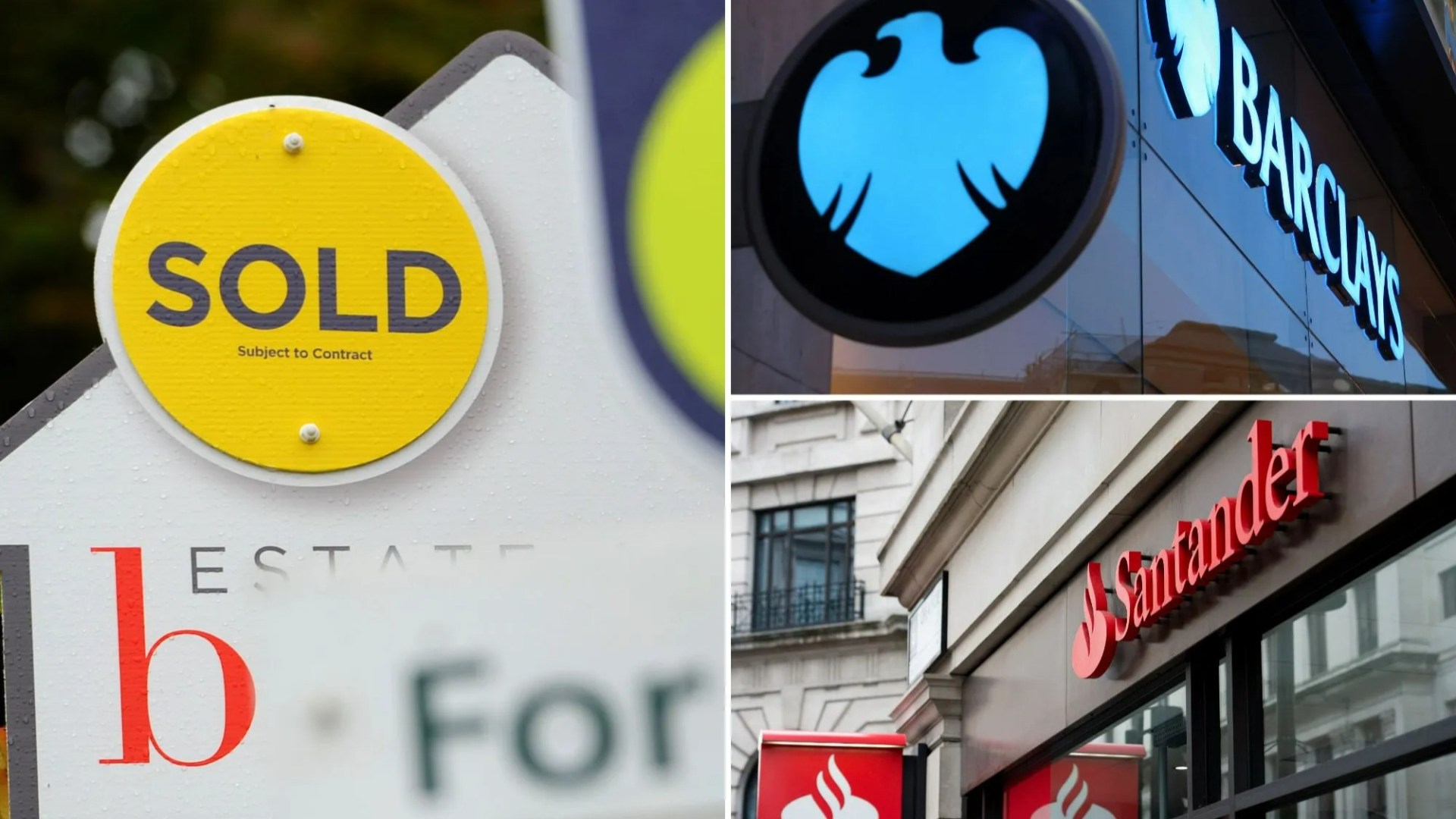Money
Barclays and Santander make big changes to mortgage interest rates TODAY in blow to borrowers

BARCLAYS and Santander are making a big change to mortgage interest rates today.
As a result, borrowers face a rise in mortgage costs, with both lenders either increasing rates or withdrawing their most affordable deals.
Recent increases in swap rates, which directly affect the cost of fixed-rate mortgages, have led experts to warn of rising mortgage rates amid various uncertainties.
Santander will “temporarily” withdraw its cheapest five-year fixed deal, offering a rate of 3.68% via brokers, at 10pm this evening.
Lenders often do this if there’s a surge in interest because it is the most competitive on the market.
Nicolas Mendes, mortgage technical manager at John Charcol, explained: “Although high demand seems positive, it can strain the lender’s ability to process applications efficiently.
“To maintain good service levels and ensure applications are handled in a timely manner, the lender may need to temporarily withdraw the product to manage their workload.
“Once they catch up, they may reintroduce the product, potentially at the same rate or with adjusted terms.”
We’ve asked Santander if it will increase the rate on this product when it returns to the market.
Meanwhile, Barclays has increased the rates on some of its fixed-rate mortgages.
The bank’s lowest five-year offer for buyers has risen from 3.71% to 3.76% overnight.
However, those looking to remortgage could benefit from a slight reduction, as Barclays’ best five-year remortgage rate has been cut from 3.93% to 3.85%.
Interest rates on home loans had been on a downward trend, leading many homeowners and buyers to anticipate further reductions.
However, experts have cautioned that rates are now climbing due to various uncertainties.
David Hollingworth, associate director at L&C Mortgages, said on Wednesday: “The mortgage market has seen rates fall in recent months, but that may be coming to an abrupt halt.
“Fixed rate pricing depends on what the market anticipates may happen to interest rates and uncertainty over the forthcoming budget, mixed messages from the Bank of England and global unrest is pushing costs back up for lenders.”
As a result, swap rates, which reflect market expectations for future interest rates, have been on the rise.
These directly impact the cost of fixed-rate mortgages, prompting lenders to increase their rates to avoid financial losses.
Smaller lenders, including Coventry Building Society, Co-operative Bank, Molo, and LiveMore, have already responded by raising rates and withdrawing their least cheapest deals.
The two-year swap rate was 4.05% as of October 9, while the five-year swap rate was 3.80%, according to Chatham Financial.
These figures are higher than the respective rates of 3.82% and 3.46% recorded in September.
Why is this happening?
A variety of factors have unsettled market expectations, causing an increase in both gilt yields and swap rates, according to Nicholas Mendes, mortgage technical manager at John Charcol.
He said: “First, Andrew Bailey’s recent comments, in which he indicated expectations for larger or more frequent interest rate reductions, have introduced some uncertainty.”
The Governor of the Bank of England indicated last week that the institution could take a “more aggressive” approach to cutting interest rates.
Currently, interest rates stand at 5%.
The rate, which banks use to determine the interest on mortgages and loans, was last reduced from 5.25% in August.
Andrew Bailey’s comments led a number of leading banks to bring forward predictions for interest rate cuts.
But this sentiment didn’t last for long.
Nicholas said: “Markets had been pricing in interest rate cuts for November and December, but expectations for December have now softened slightly.”
This shift occurred because, just a day later, various members of the Bank of England Monetary Policy Committee (MPC) expressed views contrary to those of Andrew Bailey.
MPC member Huw Pill indicated that rates should be reduced “gradually,” citing caution over the long-term trajectory of inflation.
A similar situation arose at the beginning of the year when mortgage rates initially fell below 4%, only to be increased again as it became apparent that the Bank of England would not reduce rates as swiftly as anticipated.
For now, swap rates will remain uncertain until the Bank of England decides whether to cut interest rates from 5% on November 7.
What does this mean for mortgage holders?
Swap rates primarily influence fixed-rate mortgages.
As a result, these are the main products that lenders are currently increasing.
Those on standard variable and tracker deals remain unaffected, as these mortgages are tied to the Bank of England’s base rate, which has not changed.
If you are already locked into a fixed-rate deal, you will also be unaffected.
However, the rise in fixed rates will be a significant blow to prospective homebuyers and those looking to remortgage.
According to the banking trade body UK Finance, approximately 1.6 million mortgage deals are set to expire in 2024.
This means that over a million households also face the prospect of their monthly payments increasing by hundreds of pounds.
According to moneyfactscompare.co.uk, the average two year fixed rate homeowner mortgage stands at 5.37%.
This is down from an average rate of 5.56% last month.
Meanwhile, the average five-year fixed residential mortgage rate is 5.21%, a decrease from 5.37% the previous month.
How to get the best deal on your mortgage
IF you’re looking for a traditional type of mortgage, getting the best rates depends entirely on what’s available at any given time.
There are several ways to land the best deal.
Usually the larger the deposit you have the lower the rate you can get.
If you’re remortgaging and your loan-to-value ratio (LTV) has changed, you’ll get access to better rates than before.
Your LTV will go down if your outstanding mortgage is lower and/or your home’s value is higher.
A change to your credit score or a better salary could also help you access better rates.
And if you’re nearing the end of a fixed deal soon it’s worth looking for new deals now.
You can lock in current deals sometimes up to six months before your current deal ends.
Leaving a fixed deal early will usually come with an early exit fee, so you want to avoid this extra cost.
But depending on the cost and how much you could save by switching versus sticking, it could be worth paying to leave the deal – but compare the costs first.
To find the best deal use a mortgage comparison tool to see what’s available.
You can also go to a mortgage broker who can compare a much larger range of deals for you.
Some will charge an extra fee but there are plenty who give advice for free and get paid only on commission from the lender.
You’ll also need to factor in fees for the mortgage, though some have no fees at all.
You can add the fee – sometimes more than £1,000 – to the cost of the mortgage, but be aware that means you’ll pay interest on it and so will cost more in the long term.
You can use a mortgage calculator to see how much you could borrow.
Remember you’ll have to pass the lender’s strict eligibility criteria too, which will include affordability checks and looking at your credit file.
You may also need to provide documents such as utility bills, proof of benefits, your last three month’s payslips, passports and bank statements.
Money
Three major supermarkets reveal exact dates you can book Christmas delivery slots including Sainsbury’s

THREE major supermarkets have revealed the exact dates you can book Christmas delivery slots.
With the big day just 75 days away many households are keen to get preparations underway.
In the last few years, the demand for getting your festive food shop dropped at your door has surged.
Shoppers have gone wild for the service as it helps take the pressure off an already stressful time.
But many are aware that bagging a slot during the festive period is notoriously difficult.
So it is worth being aware of the key dates of your favourite grocer so you are not disappointed.
Sainsbury’s
Sainsbury’s has today confirmed when customers can book a slot for their Christmas shop to be delivered.
Loyal customers who have the supermarket’s “Delivery Pass” get first dips and will be allowed to book home delivery and click and collect from Wednesday, October 16.
Delivery Pass holders pay a flat rate to Sainsbury’s to get their orders for free at all times of the year.
Meanwhile, non-pass holders will be allowed to book slots from the following week, Ocotber 23.
Both can schedule deliveries for between December 18 – 24.
Christmas delivery slots open on October 16 for Delivery Pass customers and 23rd October for all customers.
Customers can amend their baskets until 11pm the day before their order is due.
Waitrose
The posh grocer has already allowed its customers to start booking slots for Christmas.
It costs £4 to book a slot and orders must be over £40.
But if shoppers are keen to get their Waitrose shop delivered to their home they should act fast.
Most of the slots from Sunday, December 22 to Tuesday, December 24 are fully booked.
Dates are still available for Friday, December 20 and Saturday, December 21.
What is a grocey delivery pass?
DELIVERY passes allow customers to pay a flat fee either monthly, yearly or six monthly, and then get their deliveries for free.
In some instances, you can also get first dips on booking your Christmas delivery slot.
You should only consider taking out a delivery pass if you order groceries online regularly and if you think it will save you money in the long term.
All major grocery stores offer the service but the price varies.
For example, Tesco’s anytime delivery plan costs £7.99 per month for 12 months or £47.88 if you don’t want to pay monthly.
You can also pay £47.88 if you don’t want to pay monthly.
Meanwhile, Sainsbury’s charges £7.50 per month for the service or £80.00 for a 12-month upfront payment.
Asda has passes starting from £3.95 per month or a 12-month payment of £69.50
Morrisons also offer the service with prices starting from £5
Asda
The UK’s third-largest grocer also announced today when shoppers could secure their booking.
Like Sainsbury’s Asda is giving its delivery pass customers a head start to book their slot.
Customers who pay for this feature can book their slots for Christmas from October 15.
Meanwhile, non-pass holders can book their slot from October 22.
The supermarket said that over one million home delivery and click-and-collect slots will be available in the week leading up to Christmas.
The minimum online spend at Asda is £40 for delivery and £25 for click and collect.
Shoppers can also make changes or additions to their basket up until 11pm the night before their delivery or collection.
When do other retailers’ slots open?
It’s not just Waitrose, Asda and Saisnbury’s which offer this service to their customers.
Tesco said this month that its annual delivery pass customers can book their slots from 6am on Tuesday, November 5.
This gives customers a one-week head start on regular shoppers, who will have to wait until November 12 to nab a slot.
But if you also want to get ahead of the game, you can still sign up to the delivery plan by Monday, November 4.
Meanwhile, Morrisons has already started taking bookings with slots open now.
The same goes for Ocado with the pure-play online retailers offering customers the chance to book slots from as early as September.
M&S also launched its food-to-order service and the end of September, with slots filling up immediately.
The service lets you book and pay for your Christmas dinner and other snacks ahead of time and then collect them closer to the big day.
Orders this year can be collected on December 22, 23 or 24 in your local M&S Food Hall.
For Iceland, shoppers will be able to book delivery slots from around the middle of December.
You can read more about how this works by clicking the link here.
Money
Home REIT posts delayed 2022 results to reveal £475m loss

Home REIT also revealed its legal fees in a case brought against it by Harcus Parker on behalf of shareholders stand at around £5m.
The post Home REIT posts delayed 2022 results to reveal £475m loss appeared first on Property Week.
Money
Money Marketing Weekly Wrap-Up – 07 Oct to 11 Oct


Money Marketing’s Weekly Must-Reads: Top 10 Stories
This week’s top stories cover Chancellor Reeves’ Budget struggles and potential changes for self-employed advisers. Read on for more:
Chancellor Reeves ‘wrapping herself in a straight jacket’ ahead of Budget
Chancellor set to scrap plans to change pensions tax relief
Rachel Reeves is expected to scrap plans to alter pensions tax relief in the upcoming Budget, as reported by The Times.
Previously, there was speculation that Reeves might switch to a flat tax relief rate to address the £22bn financial shortfall. This change could have benefited basic-rate taxpayers but penalised higher earners.
Experts now suggest the government may instead introduce a “death tax” on unused pension funds and reduce employer relief on National Insurance contributions.
True Potential hires new CEO from Tesco Bank
True Potential has appointed Tesco Bank CEO Gerry Mallon as its new chief executive, replacing co-founder Daniel Harrison, who is stepping down after seven years.
Mallon, who led Tesco Bank for over six years, will assume the role in early 2025, pending regulatory approval. In the interim, chief information officer Jeff Casson will act as CEO. Mallon brings extensive experience from roles at Ulster Bank, Danske Bank and McKinsey & Co.
True Potential’s chairman praised Mallon’s credentials and commitment to client-centric values.
Aviva completes £1.5bn annuity transaction
Aviva has completed a £1.5bn bulk purchase annuity buy-in with the Michelin Pension and Life Assurance Plan, securing the benefits of around 15,000 members.
The transaction, finalised in September 2024, included an in-specie asset transfer. Aviva’s CEO of insurance, wealth and retirement, Doug Brown, highlighted the firm’s strength in large-scale pension transactions. The Michelin Pension Trustee, advised by XPS Group, expressed satisfaction with the deal’s security improvements for members.
Aviva manages assets worth £398bn and serves 19.5 million customers.
Is time up for the self-employed adviser?
The use of self-employed advisers in financial services may soon face increased scrutiny, following the IR35 case against ex-rugby player Stuart Barnes, who was left with a £700,000 tax bill.
Employment lawyer Claire Holland warns that many self-employed adviser contracts might not pass HMRC’s employment status tests. Key concerns include personal service, control and client ownership.
Firms heavily reliant on self-employed advisers should consider alternative business models, as HMRC could soon focus on the financial services sector, mirroring actions in other industries.
FCA to probe consolidation in advice market
The Financial Conduct Authority (FCA) has announced a review of consolidation in the advice market, noting an uptick in firm acquisitions over the past two years.
In a letter to advice and investment firm leaders, the FCA acknowledged that while consolidation can be beneficial, it may also lead to risks if not managed prudently.
The regulator plans to assess the suitability and financial soundness of acquisitions, urging firms to seek approval before completing transactions. Firms must prioritise good outcomes and conduct thorough due diligence, especially if acquisitions are debt-funded.
AJ Bell strengthens senior leadership team with two appointments
Mark Dampier: Why active management is really over
Mark Dampier argues that active management in the asset management industry is facing unprecedented pressure as passive funds gain dominance.
Historically, active funds were recommended for their commission structures, but recent changes have shifted investor preference towards cheaper passive options, particularly following the Retail Distribution Review and Consumer Duty regulations.
With passive funds outperforming most active funds over the past 15 years, and the growing influence of large US companies in global indices, Dampier anticipates significant consolidation within the active management sector.
Behind the Headlines: FCA consolidation review is a ‘wake-up call’ for buyers and sellers
The Financial Conduct Authority (FCA) has announced a review of consolidation in the advice market, which has become increasingly relevant amid recent activity.
As firms seek to sell before anticipated capital gains tax increases, the FCA warns buyers and sellers to ensure rigorous due diligence and regulatory compliance. The review aims to assess the suitability and financial soundness of acquisitions, stressing that poor practices could harm consumers.
Experts suggest that this is a timely move for the FCA, given evolving market dynamics and the need for updated guidelines.
‘Selling your advice firm should be the last option’
Advice firm owners should consider selling their businesses as a last resort, said Roderic Rennison from Catalyst Partners during a recent session at Money Marketing Interactive.
He advised exploring alternatives like management buyouts (MBOs), employee ownership trusts (EOTs) or family succession before deciding to sell. Rennison highlighted the importance of having a written growth strategy and warned that the sale process involves more than just the transaction itself.
Integration challenges post-sale can impact staff morale and deferred payments, making careful planning essential.
Money
We moved into a 50ft BOAT to save £1,000s on rent – we only spend £350 a MONTH… but there’s a very irritating catch

A COUPLE have revealed how they moved into a 50ft narrow boat to save thousands on rent – but are now being hit by a catch.
Alternative-living lovers Danni and Joe moved into a 50ft narrow boat to save thousands on rent but upcoming changes are likely to make their lives a lot more expensive.
The couple bought their canal boat after selling their previous mobile home – a sprinter van – for £12,000 and have been living in it for three months.
They’re currently cruising just outside of London, having made their way from the West Country into the city.
Last year, they posted a video about the savings they were making since opting for a life on water.
But they just warned potential boat-buyers that new Canal and River Trust (CRT) surcharges will increase from April next year.
These are a set of fees for anyone living on canals across England and Wales.
This means anyone on a continuous cruiser, as opposed to someone who is permanently moored, will be paying a surcharge of up to 75 per cent.
“If you’re moving onto a boat to save money then you need to know this,” Danni said.
For boats with a beam over 2.16m a surcharge of 10 per cent will be applied and for boats over 3.24m this will be an extra 20 per cent.
Danni and Joe said their first license cost them £886.31 but this has since increased to £1065.79.
From April there will be a new license price, which they said will cost about £200 more a year.
When the couple bought the dilapidated boat over a year ago they were expecting their lives to be a whole lot cheaper.
But they quickly discovered that the “boat-life” was far more expensive and complicated than they had anticipated.
Firstly, the renovation project cost between £15,000-£20,000.
Despite having some money left over from the sale of their van, they said they were living “pay cheque to pay cheque” in order to make it liveable.
One of their biggest challenges to date, the couple said, was when the boat’s battery died and they didn’t have a generator.
“When our battery died we couldn’t use our washing machine,” Danny said.
“You have to take your big bag of clothes along the tow path [to the launderette] and sometimes it’s raining but you need clean pants,” added Joe.
What are CRT charges?
From narrowboats to barges, canoes to large river cruisers, you need to license your boat if you want to keep and use it on canals and rivers.
All types and size of boat with or without a motor need a licence. Motorised boats include river boats, canal boats and houseboats.
You can buy your long-term licence at any time of the year. They start on the first day of the month and last for either three months, six months or 12 months.
You can also buy a short-term licence at any point of the year. They’re valid for one week or one month.
Different navigation authorities have different licences and fees. If you are not boating on a CRT network, you will need to contact the relevant authority:
Another thing they hadn’t accounted for were the number of logs and amount of coal they would need to keep them warm during the winter months.
One bulk bag of logs set them back £120.
“You may get this cheaper somewhere else but we don’t have a car in London,” Danni said.
Whilst bulk buying is more financially-savvy, she added, it can be a logistical pain.
“You need to work out how to get it to the boat,” she laughed.
As for gas on the boat, the adventure-loving couple said they get through a cannister a month, which costs about £50.
Although this could be cheaper if Danni had fewer baths or Joe cut down on baking, they said.
“We’re gas hungry,” they joked.
Canal boats vary in prices and can cost anything from £30,000 to way over £100,000. For a narrow boat that is fully-equipped and electric it could cost as much as £200,000.
This comes as Wayne Aspland and his partner, Angela Hughes, moved out of their home to live on their very own narrowboat.
According to this couple though, they saved a fortune, having bought the boat for just £17,000 on Facebook Marketplace.
Money
More than half of UK social impact investing goes into housing, BSC data finds

Investment in social housing stood at £5.1bn, consistent with 2022 and 2023 figures.
The post More than half of UK social impact investing goes into housing, BSC data finds appeared first on Property Week.
Money
This is wealth management’s iPhone moment?


In 2000, when the brilliant Ian Taylor and Mike Howard were launching Transact and giving advisers control like never before, the other end of the tech market saw another iconic and much-loved innovation rolled out: the Nokia 3310.
Over the next few years, 126 million of the wonderful things would be shipped to a generation of Snake addicts, who still hold it in cultish affection long after it was laid to rest in 2005.
That something could be game-changing in 2000 and obsolete in 2005 goes to show just how rapid the speed of innovation within consumer technology is.
Here’s another example. Back in 2010, less than 1% of the global population had an iPhone. By 2023, over half the planet (4.3 billion) owned a smartphone of some kind. It’s a feverishly rapid tech adoption that has reshaped nearly every aspect of our lives.
I’d go so far as to say the infrastructure of our market falls drastically behind that of nearly any other
Here in our market, however, that speed of change is nowhere to be seen.
Our world has transformed since 2000 but the software that underpins advice has barely changed at all. In fact, I’d go so far as to say that the infrastructure of our market falls drastically behind that of nearly any other.
A Nokia 3310 in an iPhone world
Why are we so behind the curve? Well, ours is a long-term industry, with a complex series of interdependencies between market participants. And at the heart of it all are financial planning professionals themselves, cleaning up the mess.
One of the unintended consequences of planners being generally excellent at what they do – building and maintaining great client relationships – is that the providers they rely on are shielded from rising customer expectations.
Like all things interconnected, our market is only as strong as its weakest link. Sooner or later, one of them will break…
Advisers bear the brunt of customer interactions. They soften the blow of poor technology – explaining, excusing and generally covering for the failings of others. They act as the valve in a creaking pressure cooker that’s well overdue its service.
But it can only go on like this so for long. Like all things interconnected, our market is only as strong as its weakest link. Sooner or later, one of them will break…
Gradually, then suddenly
The wealth management industry is on the cusp of massive transformation. An iPhone moment, you could call it.
The pressure that has been building over the last five to 10 years – gradually – can no longer be contained. The tipping point has been passed. The creaking infrastructure is about to break – to be replaced by a new operating system that can cater for the radically evolving expectations of today’s (and tomorrow’s) financial consumers.
As Hemingway’s character responded when asked how he went bankrupt: ‘Two ways. Gradually, then suddenly.’
Financial planning, its infrastructure, delivery methods and economics will all change, creating both opportunity and jeopardy in equal measure. No more compromise, less analogue and less requirement for high tech costs.
As Hemingway’s character responded when asked how he went bankrupt: ‘Two ways. Gradually, then suddenly.’
As with all predictions, I’m bound to be wrong about plenty. But of one thing I’m pretty sure. Things are going to look very, very different quite soon.
David Ferguson is chief executive officer at Seccl
-

 Science & Environment3 weeks ago
Science & Environment3 weeks agoHow to unsnarl a tangle of threads, according to physics
-

 Science & Environment3 weeks ago
Science & Environment3 weeks agoHyperelastic gel is one of the stretchiest materials known to science
-

 Technology3 weeks ago
Technology3 weeks agoWould-be reality TV contestants ‘not looking real’
-

 Womens Workouts3 weeks ago
Womens Workouts3 weeks ago3 Day Full Body Women’s Dumbbell Only Workout
-

 Science & Environment3 weeks ago
Science & Environment3 weeks agoMaxwell’s demon charges quantum batteries inside of a quantum computer
-

 Science & Environment3 weeks ago
Science & Environment3 weeks ago‘Running of the bulls’ festival crowds move like charged particles
-

 Science & Environment3 weeks ago
Science & Environment3 weeks agoLiquid crystals could improve quantum communication devices
-

 Science & Environment3 weeks ago
Science & Environment3 weeks agoQuantum ‘supersolid’ matter stirred using magnets
-
News4 weeks ago
the pick of new debut fiction
-

 Science & Environment3 weeks ago
Science & Environment3 weeks agoITER: Is the world’s biggest fusion experiment dead after new delay to 2035?
-

 Science & Environment3 weeks ago
Science & Environment3 weeks agoHow to wrap your mind around the real multiverse
-

 Science & Environment3 weeks ago
Science & Environment3 weeks agoSunlight-trapping device can generate temperatures over 1000°C
-

 Science & Environment3 weeks ago
Science & Environment3 weeks agoWhy this is a golden age for life to thrive across the universe
-

 News3 weeks ago
News3 weeks agoOur millionaire neighbour blocks us from using public footpath & screams at us in street.. it’s like living in a WARZONE – WordupNews
-

 Science & Environment3 weeks ago
Science & Environment3 weeks agoQuantum forces used to automatically assemble tiny device
-

 Science & Environment3 weeks ago
Science & Environment3 weeks agoNerve fibres in the brain could generate quantum entanglement
-

 Science & Environment2 weeks ago
Science & Environment2 weeks agoX-rays reveal half-billion-year-old insect ancestor
-

 Science & Environment3 weeks ago
Science & Environment3 weeks agoPhysicists are grappling with their own reproducibility crisis
-
Business2 weeks ago
Eurosceptic Andrej Babiš eyes return to power in Czech Republic
-

 News4 weeks ago
News4 weeks ago▶️ Hamas in the West Bank: Rising Support and Deadly Attacks You Might Not Know About
-

 Science & Environment3 weeks ago
Science & Environment3 weeks agoTime travel sci-fi novel is a rip-roaringly good thought experiment
-

 Science & Environment3 weeks ago
Science & Environment3 weeks agoLaser helps turn an electron into a coil of mass and charge
-

 Science & Environment3 weeks ago
Science & Environment3 weeks agoNuclear fusion experiment overcomes two key operating hurdles
-

 Technology2 weeks ago
Technology2 weeks agoIs sharing your smartphone PIN part of a healthy relationship?
-

 Science & Environment3 weeks ago
Science & Environment3 weeks agoCaroline Ellison aims to duck prison sentence for role in FTX collapse
-

 Science & Environment3 weeks ago
Science & Environment3 weeks agoA slight curve helps rocks make the biggest splash
-

 News3 weeks ago
News3 weeks agoYou’re a Hypocrite, And So Am I
-

 Sport3 weeks ago
Sport3 weeks agoJoshua vs Dubois: Chris Eubank Jr says ‘AJ’ could beat Tyson Fury and any other heavyweight in the world
-

 News3 weeks ago
News3 weeks ago▶️ Media Bias: How They Spin Attack on Hezbollah and Ignore the Reality
-

 Technology2 weeks ago
Technology2 weeks ago‘From a toaster to a server’: UK startup promises 5x ‘speed up without changing a line of code’ as it plans to take on Nvidia, AMD in the generative AI battlefield
-

 Football2 weeks ago
Football2 weeks agoFootball Focus: Martin Keown on Liverpool’s Alisson Becker
-

 News4 weeks ago
News4 weeks agoNew investigation ordered into ‘doorstep murder’ of Alistair Wilson
-

 Science & Environment3 weeks ago
Science & Environment3 weeks agoRethinking space and time could let us do away with dark matter
-
News3 weeks ago
The Project Censored Newsletter – May 2024
-

 Technology2 weeks ago
Technology2 weeks agoQuantum computers may work better when they ignore causality
-
Business2 weeks ago
Should London’s tax exiles head for Spain, Italy . . . or Wales?
-

 MMA2 weeks ago
MMA2 weeks agoConor McGregor challenges ‘woeful’ Belal Muhammad, tells Ilia Topuria it’s ‘on sight’
-

 Sport2 weeks ago
Sport2 weeks agoWatch UFC star deliver ‘one of the most brutal knockouts ever’ that left opponent laid spark out on the canvas
-

 Science & Environment3 weeks ago
Science & Environment3 weeks agoA new kind of experiment at the Large Hadron Collider could unravel quantum reality
-

 Science & Environment3 weeks ago
Science & Environment3 weeks agoFuture of fusion: How the UK’s JET reactor paved the way for ITER
-

 News3 weeks ago
News3 weeks agoIsrael strikes Lebanese targets as Hizbollah chief warns of ‘red lines’ crossed
-

 Technology2 weeks ago
Technology2 weeks agoGet ready for Meta Connect
-
Business1 week ago
Ukraine faces its darkest hour
-

 Health & fitness3 weeks ago
Health & fitness3 weeks agoThe secret to a six pack – and how to keep your washboard abs in 2022
-

 Science & Environment3 weeks ago
Science & Environment3 weeks agoWhy we need to invoke philosophy to judge bizarre concepts in science
-

 Science & Environment3 weeks ago
Science & Environment3 weeks agoA tale of two mysteries: ghostly neutrinos and the proton decay puzzle
-

 Science & Environment3 weeks ago
Science & Environment3 weeks agoUK spurns European invitation to join ITER nuclear fusion project
-

 Health & fitness2 weeks ago
Health & fitness2 weeks agoThe 7 lifestyle habits you can stop now for a slimmer face by next week
-

 Technology3 weeks ago
Technology3 weeks agoThe ‘superfood’ taking over fields in northern India
-

 CryptoCurrency3 weeks ago
CryptoCurrency3 weeks agoCardano founder to meet Argentina president Javier Milei
-
Politics3 weeks ago
UK consumer confidence falls sharply amid fears of ‘painful’ budget | Economics
-

 MMA3 weeks ago
MMA3 weeks agoRankings Show: Is Umar Nurmagomedov a lock to become UFC champion?
-

 News3 weeks ago
News3 weeks agoWhy Is Everyone Excited About These Smart Insoles?
-

 Science & Environment3 weeks ago
Science & Environment3 weeks agoMeet the world's first female male model | 7.30
-

 News3 weeks ago
News3 weeks agoFour dead & 18 injured in horror mass shooting with victims ‘caught in crossfire’ as cops hunt multiple gunmen
-

 Womens Workouts3 weeks ago
Womens Workouts3 weeks ago3 Day Full Body Toning Workout for Women
-

 Technology2 weeks ago
Technology2 weeks agoRobo-tuna reveals how foldable fins help the speedy fish manoeuvre
-

 News4 weeks ago
News4 weeks agoHow FedEx CEO Raj Subramaniam Is Adapting to a Post-Pandemic Economy
-

 Health & fitness3 weeks ago
Health & fitness3 weeks agoThe maps that could hold the secret to curing cancer
-

 Science & Environment3 weeks ago
Science & Environment3 weeks agoBeing in two places at once could make a quantum battery charge faster
-

 CryptoCurrency3 weeks ago
CryptoCurrency3 weeks agoLow users, sex predators kill Korean metaverses, 3AC sues Terra: Asia Express
-

 Womens Workouts3 weeks ago
Womens Workouts3 weeks agoBest Exercises if You Want to Build a Great Physique
-

 Womens Workouts3 weeks ago
Womens Workouts3 weeks agoEverything a Beginner Needs to Know About Squatting
-

 TV3 weeks ago
TV3 weeks agoCNN TÜRK – 🔴 Canlı Yayın ᴴᴰ – Canlı TV izle
-

 Science & Environment3 weeks ago
Science & Environment3 weeks agoCNN TÜRK – 🔴 Canlı Yayın ᴴᴰ – Canlı TV izle
-

 Servers computers2 weeks ago
Servers computers2 weeks agoWhat are the benefits of Blade servers compared to rack servers?
-

 Technology2 weeks ago
Technology2 weeks agoThe best robot vacuum cleaners of 2024
-
Business3 weeks ago
JPMorgan in talks to take over Apple credit card from Goldman Sachs
-

 Science & Environment3 weeks ago
Science & Environment3 weeks agoQuantum time travel: The experiment to ‘send a particle into the past’
-

 CryptoCurrency3 weeks ago
CryptoCurrency3 weeks agoDecentraland X account hacked, phishing scam targets MANA airdrop
-

 CryptoCurrency3 weeks ago
CryptoCurrency3 weeks agoBitcoin miners steamrolled after electricity thefts, exchange ‘closure’ scam: Asia Express
-

 CryptoCurrency3 weeks ago
CryptoCurrency3 weeks agoDorsey’s ‘marketplace of algorithms’ could fix social media… so why hasn’t it?
-

 CryptoCurrency3 weeks ago
CryptoCurrency3 weeks agoDZ Bank partners with Boerse Stuttgart for crypto trading
-

 Science & Environment3 weeks ago
Science & Environment3 weeks agoMost accurate clock ever can tick for 40 billion years without error
-

 CryptoCurrency3 weeks ago
CryptoCurrency3 weeks agoBitcoin bulls target $64K BTC price hurdle as US stocks eye new record
-

 Science & Environment3 weeks ago
Science & Environment3 weeks agoHow one theory ties together everything we know about the universe
-

 News3 weeks ago
News3 weeks agoChurch same-sex split affecting bishop appointments
-

 Science & Environment3 weeks ago
Science & Environment3 weeks agoTiny magnet could help measure gravity on the quantum scale
-

 CryptoCurrency3 weeks ago
CryptoCurrency3 weeks agoBlockdaemon mulls 2026 IPO: Report
-

 Sport3 weeks ago
Sport3 weeks agoUFC Edmonton fight card revealed, including Brandon Moreno vs. Amir Albazi headliner
-
Business3 weeks ago
Thames Water seeks extension on debt terms to avoid renationalisation
-

 CryptoCurrency3 weeks ago
CryptoCurrency3 weeks agoEthereum is a 'contrarian bet' into 2025, says Bitwise exec
-

 CryptoCurrency3 weeks ago
CryptoCurrency3 weeks agoCoinbase’s cbBTC surges to third-largest wrapped BTC token in just one week
-
Politics3 weeks ago
‘Appalling’ rows over Sue Gray must stop, senior ministers say | Sue Gray
-

 News2 weeks ago
News2 weeks agoUS Newspapers Diluting Democratic Discourse with Political Bias
-

 Politics3 weeks ago
Politics3 weeks agoTrump says he will meet with Indian Prime Minister Narendra Modi next week
-

 Science & Environment3 weeks ago
Science & Environment3 weeks agoPhysicists have worked out how to melt any material
-

 CryptoCurrency3 weeks ago
CryptoCurrency3 weeks agoRedStone integrates first oracle price feeds on TON blockchain
-

 CryptoCurrency3 weeks ago
CryptoCurrency3 weeks ago‘No matter how bad it gets, there’s a lot going on with NFTs’: 24 Hours of Art, NFT Creator
-

 Science & Environment3 weeks ago
Science & Environment3 weeks agoHow do you recycle a nuclear fusion reactor? We’re about to find out
-
Business3 weeks ago
How Labour donor’s largesse tarnished government’s squeaky clean image
-

 Technology3 weeks ago
Technology3 weeks agoiPhone 15 Pro Max Camera Review: Depth and Reach
-

 News3 weeks ago
News3 weeks agoBrian Tyree Henry on voicing young Megatron, his love for villain roles
-

 News3 weeks ago
News3 weeks agoBrian Tyree Henry on voicing young Megatron, his love for villain roles
-

 Travel2 weeks ago
Travel2 weeks agoDelta signs codeshare agreement with SAS
-

 Politics2 weeks ago
Politics2 weeks agoHope, finally? Keir Starmer’s first conference in power – podcast | News
-

 CryptoCurrency3 weeks ago
CryptoCurrency3 weeks agoLouisiana takes first crypto payment over Bitcoin Lightning
-

 CryptoCurrency3 weeks ago
CryptoCurrency3 weeks agoCrypto scammers orchestrate massive hack on X but barely made $8K
-

 CryptoCurrency3 weeks ago
CryptoCurrency3 weeks agoTelegram bot Banana Gun’s users drained of over $1.9M
-

 CryptoCurrency3 weeks ago
CryptoCurrency3 weeks agoSEC asks court for four months to produce documents for Coinbase







You must be logged in to post a comment Login